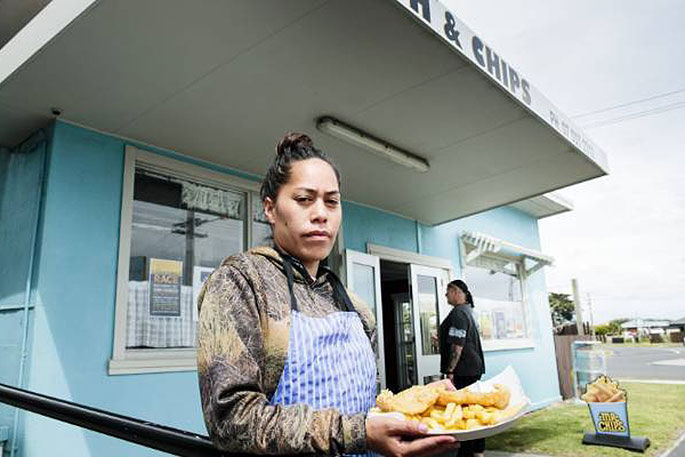There's a sign in the window of Maketu Takeaways - the fish 'n chip shop immortalised in Robin White's 1975 painting - saying "no eftpos, sorry for the inconvenience".
It's not some technical glitch, but the result of the latest move by the state - and now private companies - to crack down on the shop's owner, senior Mongrel Mob member Valentine Nicholas.
Nicholas has been in police sights ever since he was acquitted of money laundering charges at trial in 2015.
Police used the Criminal Proceeds (Recovery) Act, which has a lower threshold than criminal charges, to seize assets worth more than $1m, including three adjoining waterfront properties in Maketu, a forestry block in Gisborne, nine bank accounts containing $26,000, shares worth $14,000, motorbikes and cars and $8000 cash.
They claimed it was the proceeds of criminal offending - which Nicholas denies.
The Court of Appeal allowed Nicholas to challenge the High Court finding, arguing that the ancestral land, left to him by his father, is of cultural and spiritual significance to him.
The case remains before the courts.
Nicholas accuses police of having a personal vendetta against him, but Detective Inspector Craig Hamilton, of the Hamilton police asset recovery unit, says police actions were "appropriate and justified".
"People who are involved in crime which harm our communities will naturally attract our attention, and we will respond to their activities accordingly."
Nicholas is now fighting another battle - against his bank.
In March he bought the takeaway shop, after his brother, fellow Mongrel Mob member William Nicholas, put the business into liquidation owing more than $100,000 to the IRD.
Nicholas started a new company, Maketu Takeaways, of which he was director and shareholder.
The shop's banking was with ANZ, where Nicholas had held an account for 52 years since opening one as a five-year-old schoolboy.
He says he was never overdrawn and always paid his credit cards on time.
But then out of the blue, without explanation, ANZ closed his personal accounts and told him it would no longer offer him banking services.
"They said 'under general terms and conditions, we don't have to have a reason - we can pull the plug whenever we like'," Nicholas says, in his first full media interview.
Nicholas consulted a lawyer and was advised to stand down as a director of Maketu Takeaways so its banking wouldn't be affected.
He did that, and put his shares into a trust, although he continued to help his mother-in-law and daughter-in-law run the place.
A friend who runs a honey business and has no Mongrel Mob connections was appointed a director and shareholder and bank accounts were in his name.
For a couple of weeks everything continued as usual, until last week Nicholas got a call from food wholesaler Bidvest, which supplies his chips, spring rolls and sausages.
"There's an automatic payment going out of the fish shop account, they went to draw out their money and it wouldn't let them."
ANZ had closed that account as well.
It's forced the shop to become cash-only.
"Eftpos is 80 to 90 per cent of the fish shop business," says Nicholas.
"It's a bugger. The shop owner across the road has been good - he's giving out eftpos cash for the locals to come over and buy their fish and chips.
"But he closes at six, so we've got an hour where you can't get eftpos. If they're locals we've been going 'come in and pay it tomorrow'."
Nicholas believes police tipped off ANZ. "I don't think it's [ANZ], I think it's the police who've got a bug in their arse."
Hamilton says it's common for police to make inquiries with banks when investigating suspected criminals.
"As such, banks will inevitably learn of a police investigation through this process."
Nicholas has also been forced to stand down from his role as treasurer of the local kohanga reo - a position he'd held since 1994 - after police contacted the organisation's head office.
After his ANZ accounts were closed, Nicholas opened an account with Kiwibank. A week later it sent him a letter saying it would no longer offer him banking services, again without explanation.
Both ANZ and Kiwibank refused to discuss an individual customer, but said they were within their rights to close accounts without explanation.
"We take a number of factors into consideration," an ANZ spokesman said. "We're upfront about it - our rights to end a contractual relationship are set out in our terms and conditions."
A Kiwibank spokeswoman said: "If the customer believes there has been a mistake they are welcome to make contact with the complaints team."
Banking ombudsman Nicola Sladden said banks were under no obligation to continue doing business with a person or company, but they should not close an account without good reason.
"Banks should give reasonable notice of an account closure, so customers have enough time to make alternative banking arrangements. We consider 'reasonable notice' as at least 14 days."
Nicholas said police had accused him of making his money through selling cannabis, which he denied.
"My record is violence from when I was a young man...not drugs or pinching."
He said the proceeds of crime legislation was "crazy".
"What they're basically saying is, 'the jury's wrong and we're right, so we're gonna carry on anyway'.
"They say the onus is on you to prove where you got your stuff from. I told them, 'how do I prove a figment of your imagination?"



0 comments
Leave a Comment
You must be logged in to make a comment.